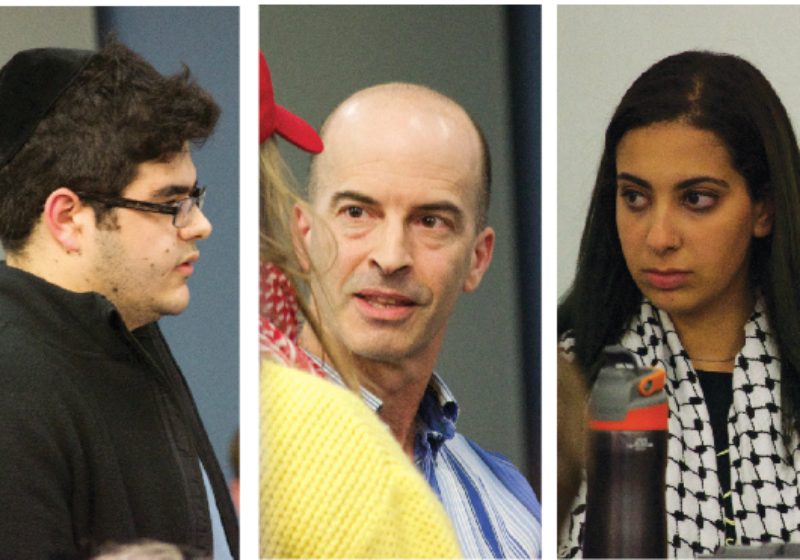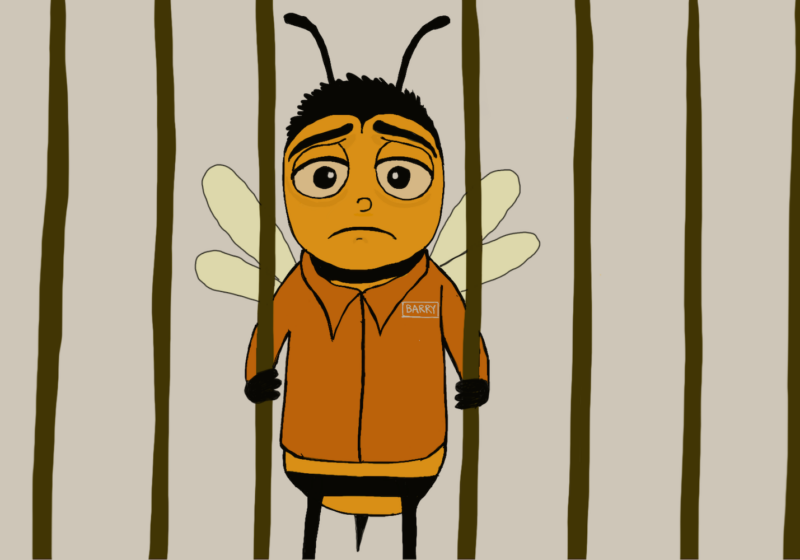It seemed bound to happen.
Tensions boiled over Wednesday night during a Q&A session following the screening of a documentary critical of Israel, as audience questioners at the Students for a Democratic Society (SDS) event clashed with panelists and moderators amid complaints and cheers from the crowd.
And the conflict continued after the event—when its panelists and SDS members allege that an audience member came uncomfortably close to one panelist and berated her with questions, while others surrounded them.
“Is this for education purposes?” the first man to the audience microphone asked, after identifying himself as a Jewish refugee forced from Libya in 1967 who is not popularly considered a refugee because he is not Palestinian.
“What point are you trying to make?” called out an attendee, one of a string of frustrations people aired with the questioner.
“You want to ask me a question about my experiences, or his experience, or her experience?” asked Fawzi Ali, a junior panelist and American-Palestinian dual citizen who earlier had described visiting family in Palestine.
Co-panelists freshman Ariel Adelman, who was born in Israel, and senior Ibrahim Mohammad, a Palestinian refugee from Lebanon who said he is “technically stateless,” had done the same, each discussing travel and other restrictions in their homelands for Palestinians and refugees.
“I’m not here to argue, I’m not here to convince you,” the questioner said, raising his voice, before asking, “Are the people who organized this intending to present the other side?”
He was promptly shouted away from the microphone.
Prior Criticism Sets Stage
The days leading up to the screening had been filled with criticism, and defense, of SDS and its Palestinian Awareness Month encouraged by a widely-shared opinion piece written in the Campus Times by senior Yael Schiller that claimed the group has a “clear anti-Israel agenda.”
The documentary, “The Occupation of the American Mind: Israel’s Public Relations War in the United States,” argued that Israel and its allies have shaped American media coverage of its policies in the Gaza Strip and other disputed territories to reflect positively on it and negatively on Palestinians.
At least 100 people attended the screening, including four Department of Public Safety officers, whose presence SDS’ advisor had requested.
Throughout the event, officers let people waiting outside the Morey Hall auditorium through the doors whenever someone left, despite objections from viewers who were saving seats.
Senior Nhan Le, SDS co-president, acknowledged the group’s “defensiveness by having Public Safety police the event” in a later email, but said it “had to be defensive against an offensive and potentially violent force” for the safety of the event’s attendees.
Nhan also said that Dean of Admissions and Financial Aid Jonathan Burdick had advised the group to contact Public Safety, but Burdick told the Campus Times that he had only suggested a member of the group be ready to call in case “someone decides to act inappropriately.”
“During the event I briefly saw a Facebook Live recording, and I was surprised to see that Public Safety was there,” he said. “If the group had been following my advice […] that would only have been true if something disruptive had already occurred.”
His advice, sent verbatim to the Campus Times, included phrases like “don’t try to exclude anyone” and “SDS isn’t having this event just to talk to themselves, right? Make this an opportunity to invite others to listen and learn.”
Interruption, Shouts
The recent controversy seemed to hang in the air.
Organizers opened with remarks about the criticism. During one scene in the film featuring a strong pro-Israel address, scant applause came from the back of the auditorium. It was met with turned heads and glares from many in the crowd.
Later in the Q&A session, sophomore Elie Cohen was interrupted when he began speaking about education in Palestine on the kidnapping and murder of 11 Israeli athletes during the 1972 Munich Olympics by a Palestinian terrorist group.
“If you’re going to ask a question, you are not going to make a statement,” sophomore Farida Ibrahim, one of the moderators, said.
When Cohen replied that he wanted to express an opinion, the other moderator, sophomore Yoenia Krokova, interjected: “Is the opinion a question?”
Cohen said yes, but when he resumed speaking he was quickly cut short by an SDS organizer and engaged by Ibrahim.
“You are not going to talk to them about statistics,” she said. “They don’t have anything to say to that. It’s none of their business—you can go read about it on Google.”
She added, to applause, “These panelists are here to talk about their lives. They have nothing to say to you about what the Palestinian Authority or the government has put in the textbook of Palestinians.”
As complaints from the audience grew and a Public Safety officer walked his way, Cohen left the mic.
A few questions later, a similar scene ended in shouts when an older attendee asked Ali, “Do you recognize the right of the Jewish people to have their own state and their land?”
Ali answered, “Of course,” but when he paused and the attendee repeated his question, the moderators ended the exchange and the event.
It was then that Adelman, the Israeli-American panelist, said she was confronted by an “Orthodox [Jewish] person” and several Jewish students.
“He physically came very close to me and started asking me a lot of loaded questions,” Adelman said in an email. “At one point he implied (definitely didn’t outright say, it was just a very clear implication) that only Palestinians are violent and Israeli Jews never are.”
She is afraid she will be harassed in the future.
“And I definitely don’t want to try to go to any Jewish events,” she said. “They clearly don’t want a dissenter anywhere near them.”
Her account was supported by SDS leadership, a moderator, and another panelist.
Junior Jacob Niebloom, who Adelman said was part of the group of students who approached her, refuted her claim in a later email.
“[He] was never physically close to Ariel,” he said. “It was quite civil from my point of view, even though she was clearly emotional about the topic.”
Bashing Israel or Uplifting Palestine?
Asked in an email for comment, Cohen called the event uncoordinated and said it did not achieve its goals.
“I thought it was more of an Israel-bashing ‘documentary,’ opposed to one that, ‘explains the Palestinian voice,’” he said. “I hoped that after such a video, that there would be some political discussion about the claims made (since the video was purely political propaganda), but none of that was allowed. Public Safety nearly escorted me out of the event for questioning the legitimacy of the panelist’s claim that the Palestinian schools are not forcing an anti-Israel ideology.”
He said the movie and panel discussion should have been separate events.
“Bottom line, what frustrated me and many others in the room, was not only the anti-Israel rhetoric, but that they refused to back up any of the claims being made,” he said. “They thought that the correct way to respond to a video that supposedly expresses the Palestinian suffering, that made bold claims with little to no background context, was to host a panel that spoke only about their experiences and nothing else.”
Ibrahim, for her part as a moderator, didn’t think the questioners learned much from what the panelists had said about their personal lives.
“The panelists are literally students and yet these adults (most were not even students) went up to berate them with questions about terrorism,” she said in an email. “It’s like they had earplugs in the entire time and were waiting nonetheless just to provoke us. We even cut them off and kindly asked that they stop making statements and instead actually ask a question, but they were persistent and offensive and so the officer had to interfere.”
She continued, “It was disgusting because the only thing they had to say was about terrorism which clearly implies that this is the only thing they have to ask Palestinians or Arabs or Muslims.”
The older, non-student questioners there were not interested in listening, she said, but only in speaking their mind.
“And that of course has to be at our Palestine events and over the voices of Palestinian and Arab students,” she said.
Parallel Calls to Action
Le said in his email interview that Public Safety had been asked to attend out of concerns stemming from a UR student reaching out to a “radical right-wing non-student group (Roc4Israel) prompting locals to attend (read: heckle) our event to ‘balance out the hate’ so that Jewish students can ‘feel safe.’”
“We do not know what his intentions behind the email were, but we know that the end result was clear hate—in the form of threats of violence, accusations of anti-Semitism and pro-terrorism, public attacks on Facebook, and a hit piece in the Campus Times (which we easily debunked),” he said, referring not to physical violence but loaded language directed toward Ibrahim.
The Campus Times obtained the email sent to Roc4Israel, which was written by Niebloom.
“I am asking the Jewish (and Christian, Hindu, Buddhist, Muslim) community of the greater Rochester area to show your support by alerting more members of our community in order to unite together and attend this event,” Niebloom said in the Oct. 30 letter. “I hope that with enough of our community in the audience we will have people to stand up against any potential injustice and unfair treatment towards Israel or the Jewish people at this event.”
Niebloom said his motivation behind the invitation was “to make the community aware of the anti-Israel and anti-Semitic agenda that many students are attempting to spread on this campus.”
He added that it’s important to “show people what’s happening on this campus” because families are considering this school for their children.
The Campus Times also obtained an email from sophomore Maggie Liu, SDS’ State Oppression and Palestine Awareness Committee Chair, sent to student groups and titled “*URGENT Call to Action – Students for a Democratic Society*,” in which she says Roc4Israel is “trying to silence us.”
“We need your support,” she said. “We need to do exactly what they’re doing: rallying together but standing up for human injustice.”
She closed, in italics, “This is not a religious issue; this is a human rights issue.”





